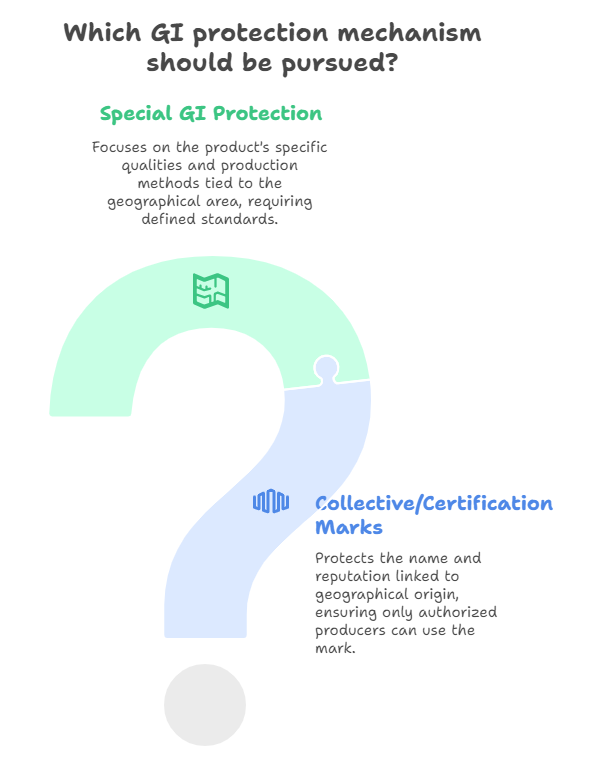For global businesses sourcing products like Pu’er tea or Shaoxing wine, understanding China’s geographical indication (GI) system is crucial. GIs protect products whose qualities or reputation stem from their specific origin. With over 1,576 products protected under China’s GI system as of 2023, this legal tool safeguards regional heritage and economic value. Failure to verify legitimate GIs can lead to costly legal disputes, reputational damage, and import rejections.

China’s Dual Protection System for GIs
China offers two primary legal pathways for GI protection:
- Collective/Certification Marks under the Trademark Law:
- Mechanism: Producer associations register signs (names, logos) as collective or certification marks with the China National Intellectual Property Administration (CNIPA).
- Scope: Protects the name and reputation linked to the geographical origin. Only authorized producers meeting strict standards can use the mark.
- Examples: “Longjing Tea” (Longjing, Zhejiang), “Anji White Tea” (Anji, Zhejiang), “Foshan Ceramics” (Foshan, Guangdong).
- Special Geographical Indication Protection:
- Mechanism: Regulated by the State Administration for Market Regulation (SAMR) under the Measures for the Protection of Geographical Indication Products.
- Scope: Focuses on the product itself – its specific qualities, characteristics, and production methods intrinsically tied to the geographical area. Requires defining the protected area and technical standards.
- Examples: “Jinhua Ham,” “Dongting Biluochun Tea,” “Xinjiang Hami Melon.”
The Trademark Law (Article 16) explicitly prohibits registering a mark containing a GI for goods not originating from that region if it would mislead the public. This forms a critical legal basis for enforcement.
Notable Cases of GI Infringement in China
China has strengthened GI enforcement, leading to several high-profile cases:
- The “Shaoxing Wine” Case (Ongoing Vigilance):
- Infringement: Wineries outside Shaoxing, Zhejiang province, labeled their products as “Shaoxing Wine” without authorization. Genuine Shaoxing wine relies on specific local water, climate, and traditional brewing techniques.
- Action: The Shaoxing Wine Industry Association, holder of the certification mark, actively monitors the market and files administrative complaints and lawsuits. Local market supervision authorities conduct raids and impose fines, confiscate counterfeit goods, and revoke business licenses in severe cases.
- Outcome: Continuous enforcement actions have significantly reduced blatant counterfeiting, though vigilance remains necessary. This case highlights the importance of producer associations actively defending their marks.
- The “Anji White Tea” Counterfeiting Network (2022):
- Infringement: A large-scale operation was uncovered where tea produced in other regions was packaged and sold online as premium “Anji White Tea” at high prices. This damaged the GI’s reputation for quality and unique characteristics tied to Anji’s environment.
- Action: Anji County market regulators, acting on complaints and investigations, raided multiple production and storage facilities. Evidence included fake packaging, sales records, and mislabeled products.
- Outcome: Authorities confiscated tons of counterfeit tea and packaging materials, imposed substantial administrative fines exceeding 1 million RMB, and pursued criminal charges against the ringleaders for trademark infringement and fraud. This case demonstrated coordinated enforcement efforts targeting online and offline distribution chains.
- “Wuchang Rice” Labeling Dispute:
- Infringement: Producers outside the designated Wuchang area in Heilongjiang province used “Wuchang Rice” on packaging. Authentic Wuchang rice is famed for its unique flavor and texture due to the local black soil and climate.
- Action: The legitimate producers’ association pursued legal action. The key challenge was proving consumer confusion and establishing the boundaries of the protected designation.
- Outcome: Courts often rule in favor of the GI right holders, ordering cessation of infringing use and awarding damages based on illicit profits and harm to the GI’s reputation. This emphasizes the role of litigation in clarifying and enforcing boundaries.
Why GI Verification Matters for International Businesses
- Avoiding Legal & Financial Risk: Importing or selling counterfeit GI products can lead to customs seizures, lawsuits for trademark infringement/unfair competition, hefty fines, and destruction of goods.
- Ensuring Authenticity & Quality: Verifying GI legitimacy protects your supply chain, ensuring you receive the authentic product with the qualities expected by consumers, safeguarding your brand reputation.
- Ethical Sourcing & Consumer Trust: Demonstrating due diligence in sourcing authentic GIs aligns with ethical business practices and builds consumer trust in your brand’s integrity.
Verifying Chinese GIs: Key Steps for Due Diligence
- Check Official Registries: Search CNIPA’s trademark database for registered collective/certification marks and SAMR’s GI product registry.
- Verify Authorized Users: Contact the managing association (listed in registries) to confirm if a specific producer is authorized to use the GI mark.
- Scrutinize Documentation: Require suppliers to provide proof of authorization and certificates of origin compliant with the GI’s technical specifications.
- Understand the Specifications: Familiarize yourself with the official product standards defining the genuine GI product’s characteristics and production area.
Navigating China’s GI landscape requires diligence. Verifying a Chinese partner’s authorization to use a specific GI mark is a fundamental step in mitigating supply chain risks. For comprehensive due diligence, including trademark and GI status verification within broader company credit and risk reports, explore our specialized Intellectual Property Search Services. Understanding the legal framework and learning from past infringement cases empowers businesses to source authentic products and operate confidently within China’s complex market. Trustworthy partners rely on thorough verification to protect their investments and reputations. Discover how our detailed Business Credit Reports provide essential insights for secure market entry and partnership decisions.
